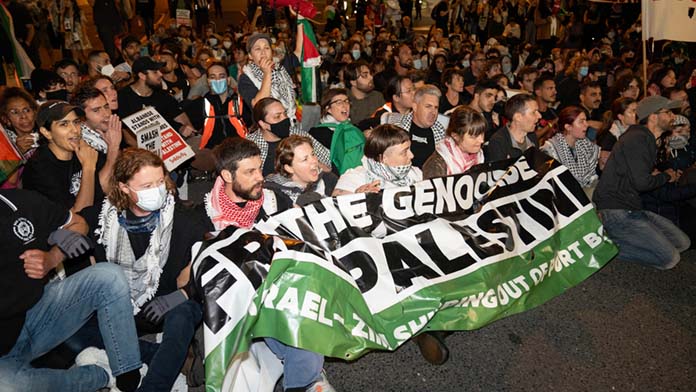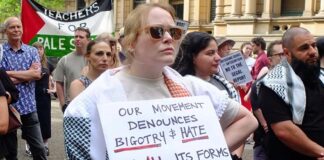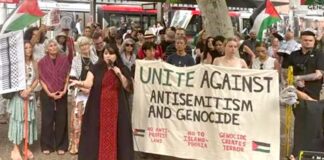Nineteen people, including the Secretary of the Sydney branch of the MUA Paul Keating, the MUA branch organiser, an International Transport Workers Federation inspector and other MUA members, were arrested in confrontation with scores of police on Sunday night, as around 300 pro-Palestine protesters attempted to block the entrance to Sydney’s Port Botany where the ZIM ship Ganges was docked.
The entrance to the Patrick terminal and the roads leading to the dock were blocked for an hour after protesters, with MUA flags in the lead, marched out of the park and occupied the area. The protest drew support from contingents from Students Against War, Teachers and School Staff for Palestine, ASU and PSA Unionists for Palestine, nurses’ union members, the Sydney Uni BDS committee and the Palestine Justice Movement (PJM).
After hearing from Greens Senator Mehreen Faruqi, the MUA’s Paul Keating, Nat Wasley of Trade Unionists for Palestine and Ahmed Abadla (PJM), hundreds of people crossed the road, marching to the entrance to the Patrick terminal in an effort to block the Patrick night shift. Scores of police blocked the road into the terminal.
After 20 minutes blocking the entrance and cutting all traffic in and out of the terminal, police moved on the group of MUA members at the head of the protest, arresting five MUA members, including Keating.
Just as in the Sydney ZIM protest last November when 23 were arrested, the police have used NSW’s draconian anti-protest laws to charge the 19 arrested on Sunday night. They have been charged with disruption to a major facility in Port Botany as well as obstructing traffic and failing to comply with a police direction, and will face court on 8 May.
The anti-protest laws carry a maximum penalty of a $22,000 fine, two years jail or both.
Union support
In the run-up to the protest the MUA had organised workplace meetings in Patrick to raise the issue of Palestine with the Patrick wharfies. The day before the protest every wharfie in Sydney got a text message indicating the union support for the community picket and encouraging workers to join the protest.
A ZIM fact sheet written for wharfies, explaining why Palestine is union business, had also been circulated among the Patrick wharfies.
A strong motion in support of Palestine was also carried at the MUA national delegates conference at the end of February.
Thousands of “Block the Boat” leaflets had been distributed at the weekend Palestine rallies encouraging people to sign up for the ZIM protest SMS alerts.
The ZIM protests have been part of Sydney’s Unionists for Palestine and the Palestine Justice Movement’s efforts to raise awareness amongst workers and build union action to target government support for Israel.
The call to get ZIM shipping out of Port Botany is part of demanding sanctions on companies that aid and abet Israel’s genocidal attack on Gaza. Breaking Australian economic and military links would bring real pressure to bear and help isolate Israel.
ZIM has also been targeted by protests in Fremantle and in Melbourne, where protesters held up a ZIM ship for four days in January. ZIM ships have also been targeted by port workers internationally.
The task now is to campaign to build deeper roots in the union movement and the confidence for workers themselves to take industrial action to sanction Israeli companies.
State public servants in NSW are campaigning against Hewlett Packard’s contracts with the state Labor government. Paul Keating’s arrest has raised the profile of union action in the Palestine campaign, and provides a focus to build wider union support in the MUA and other unions. In Sydney, there will be official May Day events as well as a strike and rally on 1 May itself that will be a chance to build that union support.
We should build union support for a protest outside the court on 8 May when the ZIM arrestees will have to appear, as well as on 22 April when arrestees from the earlier ZIM protest are in court. Unions NSW is already committed to opposing the anti-protest laws—and demanding the state Labor government repeal them.
The same NSW Premier Chris Minns who bathed the Opera House in the colours of the Israeli flag last October has praised the police for the brutal arrests at the ZIM protest. Now there is a chance to connect the fight against the NSW Labor Premier’s support for Israel with his continued use of anti-protest laws against unionists and protesters.
In a great development for the Palestine campaign, the Victorian Trades Hall Council advertised a union contingent for Melbourne’s Palestine rally last weekend on Palm Sunday. Getting similar action from Unions NSW and unions in every state would be a solid step forward. This is the kind of action that can increase pressure on the Albanese government to end its support for Israel’s genocide.
In the 1960s and 1970s during the campaigns against apartheid in South Africa and against the Vietnam War, maritime workers placed bans on ships. But such action is now illegal. The laws that prevent workers taking industrial action outside a bargaining period or taking industrial action in support of other workers also prevent workers taking action in solidarity with Palestine.
The Albanese Labor government that refuses to call for a permanent ceasefire has also done nothing to remove the shackles on the union movement. Workers and unions will have to confront the Labor government’s anti-strike laws to take action for Palestine—bad laws have to be broken.
Deepening connections between the Palestine campaign and the union movement can build the possibilities for industrial action as a crucial part of building the struggle to Free Palestine.
By Ian Rintoul






